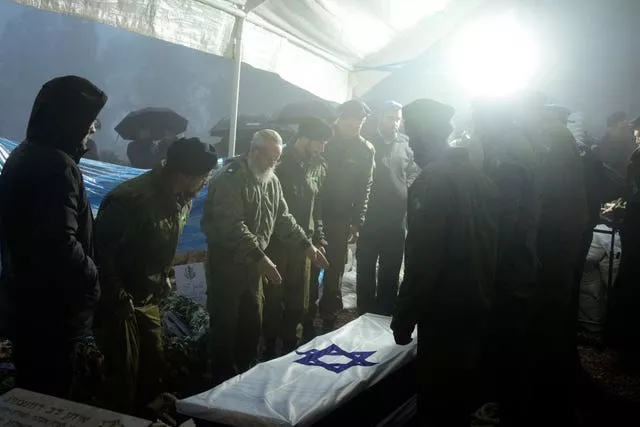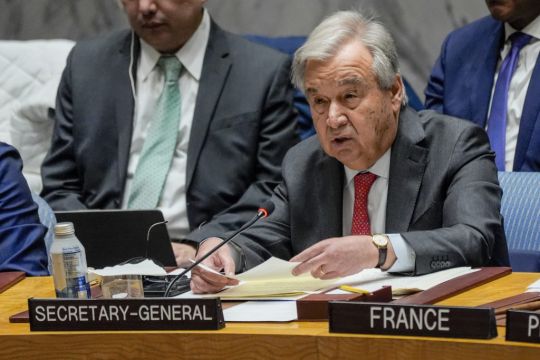Israeli Prime Minister Benjamin Netanyahu’s rejection of a two-state solution will indefinitely prolong a war threatening global peace and emboldening extremists everywhere, the United Nations’ chief has said.
In his toughest language yet on the Israeli-Hamas conflict, secretary-general Antonio Guterres told a ministerial meeting of the UN Security Council that “the right of the Palestinian people to build their own fully independent state must be recognised by all, and a refusal to accept the two-state solution by any party must be firmly rejected”.
The alternative of a one-state solution “with such a large number of Palestinians inside without any real sense of freedom, rights and dignity … will be inconceivable”, he said.
Mr Guterres also said the risks of regional escalation of the conflict “are now becoming a reality”, pointing to Lebanon, Yemen, Syria, Iraq and Pakistan.
He urged all parties “to step back from the brink and to consider the horrendous costs” of a wider war.

Mr Netanyahu’s rejection of a Palestinian state in any post-war scenario opened a wide rift with Israel’s closest ally, the United States, which says the war must lead to negotiations for a two-state solution where Israel and the Palestinians can live side-by-side in peace.
That goal is supported by countries around the world, as ministers and ambassadors reiterated on Tuesday.
The UN secretary-general also repeated his longstanding call for a humanitarian ceasefire — an appeal supported by almost all nations.
But Israel’s UN ambassador Gilad Erdan again rejected a ceasefire, saying Hamas, which carried out a brutal attack on southern Israel on October 7, is committed to attacking again and destroying Israel, and a halt to fighting would only allow the militants “to regroup and rearm”.
He urged the Security Council to “eliminate the root” of the conflict, which he said was Iran.
Mr Erdan strongly criticised the presence of Iran’s foreign minister at the council meeting, saying the country provides weapons to Hamas, to Hezbollah fighters in Lebanon and Houthi militants in Yemen, “and soon these acts will be carried out under a nuclear umbrella”.
Iran has long denied seeking nuclear weapons and insists its nuclear programme is entirely for peaceful purposes.

But the UN nuclear watchdog has said Iran has enough enriched uranium for nuclear bombs if it chose to build them.
Riyad al Maliki, the Palestinian foreign minister, said Israel is carrying out “the most savage bombing campaign” since the Second World War, which is leading to famine and the massive displacement of civilians.
“This is an assault of atrocities,” which has destroyed countless innocent lives, he said.
The Health Ministry in Hamas-ruled Gaza says more than 25,000 Palestinians have been killed since the start of the war, which has caused widespread destruction, displaced an estimated 85% of Gaza’s 2.3 million people and left a quarter facing starvation.
Israel began its military campaign in response to the October 7 attacks in which militants from the enclave killed around 1,200 people in Israel and took about 250 hostages.
Mr al Maliki said Israel does not see the Palestinians as a people and a “political reality to coexist with, but as a demographic threat to get rid of through death, displacement or subjugation”.
He said those are the choices Israel has offered Palestinians, calling them tantamount to “genocide, ethnic cleansing or apartheid”.
Mr al Maliki said there are only two future paths; one starts with Palestinian freedom and leads to Middle East peace and security, and the other denies freedom and “dooms our region to further bloodshed and endless conflict”.







